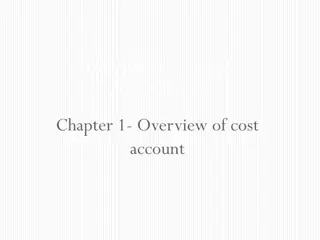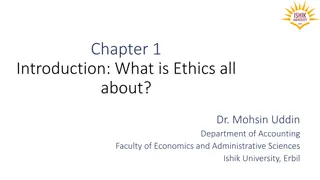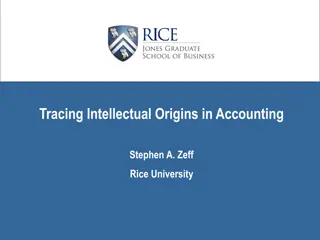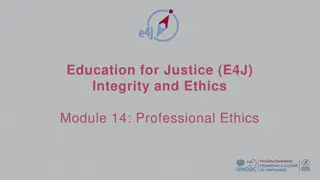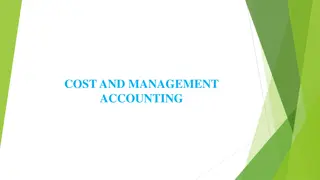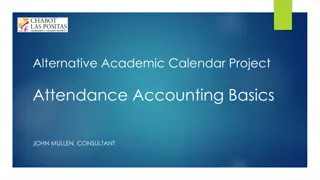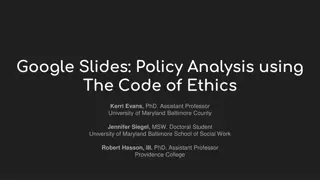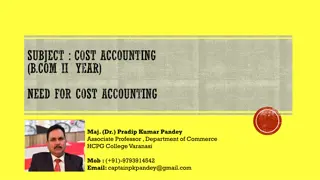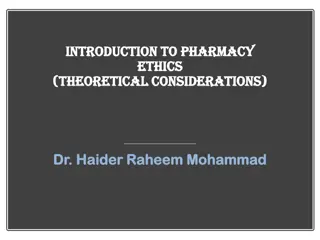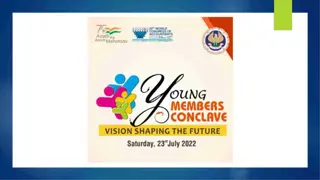Understanding the Code of Ethics in Professional Accounting Practice
Exploring the importance and practical aspects of the Code of Ethics (COE) in the field of professional accounting, emphasizing the accountability to one's conscience and the need for credibility in maintaining the foundation of the profession. Delving into ancient ethical principles and their relevance in modern times to ensure ethical conduct and independence in service and public practice as defined by regulatory bodies.
Download Presentation

Please find below an Image/Link to download the presentation.
The content on the website is provided AS IS for your information and personal use only. It may not be sold, licensed, or shared on other websites without obtaining consent from the author. Download presentation by click this link. If you encounter any issues during the download, it is possible that the publisher has removed the file from their server.
E N D
Presentation Transcript
Code of Ethics Case Studies -CA C N VAZE 27.07.2021 1 FOR RAJKOT BRANCH OF WIRC OF ICAI
MOTTO 3 2 That person who is awake in those that sleep, shaping desire after desire, that, indeed, is the pure. That is Brahman, that, indeed, is called the immortal. In it all the worlds rest and no one ever goes beyond it. This, verily, is that, kamam kamam : desire after desire, really objects of desire. Even dream objects like objects of walking consciousness are due to the Supreme Person. Even dream consciousness is a proof of the existence of the self. No one ever goes beyond it : cf. Eckhart : 'On reaching God all progress ends
Introduction 3 Ethics means moral values accountability to one s conscience. Code of Ethics ( COE ) is not only philosophical, but practical. Hence, the title Code of Ethics Practical Issues Eternal vigilance is the cost of independence. In the field of Ethics, one is either ethical or not ethical. There is no in between stage.
Need of COE 4 Why we alone are subjected to such a rigorous code? To ensure credibility which is the foundation of our profession Society s expectations An outsider s perception - delays, mild punishment etc. A shield rather than a burden
Source of COE. Source of COE . 5 Ethics are as old as human civilization Taittreeya Upanishad Satyam Vada Speak the truth Dharmam Chara Follow the rules of the religion(perform duty); and Swadhyayan-Ma-Pramadah Do not commit default in self- study (This is our CPE). COE is nothing but elaboration of these principles
Code of Ethics Published by ICAI Revised in 2019, 2020 Volume I Complying with the code, Fundamental Principles and Conceptual Framework Defined Professional Accountants in Service and in Public Practice Independence Standards (4A & 4B) Independence for Audit & Assurance 6
Code of Ethics (Contd..) 7 Volume II Accounting and Auditing Standards The Chartered Accountants Act, 1949 Schedules Council Guidelines for Advertisement, 2008 Council General Guidelines, 2008 Self-Regulatory Measures Recommended by the Council Volume III Case Laws
The Fundamental Principles 8 Integrity Objectivity Professional Competence and Due Care Confidentiality Professional behaviour
Certain Important High-Court Decisions 9 1. Other Misconduct Only when a member is acting as a CA ? or acting in any capacity. (e.g.- in private functions) 2. Error, Blunder, Negligence, Gross Negigence 3. Fee based on results of the work: (Fee on total addition in assessment and not on results)
The First Schedule 10 Part I Part I Clause no. A member in practice would be guilty of misconduct if he: (1) Allows any person to practice in his name except his partner and employee who is also a chartered accountant Pays any share , commission or brokerage to person other than member of Institute or his partner or retired partner Accepts profits from a person who is not a member of Institute Enters into partnership with person who is not member of Institute Secures work from person who is not his employee or partner. Solicits work by circular, advertisement, personal interview etc. (except to the extent allowed) Advertises his professional services (except to the extent allowed) Accepts audit work without first communicating with the previous auditor in writing (2) (3) (4) (5) (6) (7) (8)
The First Schedule Part I (contd..) Part I (contd..) 11 Clause no. (9) A member in practice would be guilty of misconduct if he: Accepts audit work without first ascertaining that requirements of section 225 of the Companies Act, 1956 (now section 140 of the Companies Act, 2013) are complied with. Accepts professional assignment where fees are based on percentage of profits or are contingent upon the findings or results. Engages in any other business or occupation (barring few exceptions) Allows a person who is not his partner or any other person who is not a member of the Institute to sign on his behalf any balance sheet, profit and loss account, report or financial statements (10) (11) (12)
First Schedule Part II Members in service 12 Clause no. (1) (2) A member (other than member in practice) would be guilty of misconduct if he: Undertakes to share his emoluments of employment Accepts any part of fees, profits or gains from any lawyer, CA, broker engaged by the company, customer as commission or gratification
First Schedule Part III - Members generally A member (whether in practice or not) would be guilty of misconduct if he: 13 Clause no. (1) (2) Not being a fellow, acts as a fellow Does not supply information called for by the Institute, Council, its Committees, Director (Discipline), BOD, DC etc. Gives information knowing it to be false while inviting professional work, responding to tenders, enquiries or publishing write up. Part IV Other misconduct A member (whether in practice or not) would be guilty of misconduct if he: Is held guilty by any civil or criminal court which is punishable with imprisonment not exceeding 6 months. Brings disrepute to the profession (3) Clause no. (1) (2)
Second Schedule Part I: 14 Claus e no. (1) A member in practice would be guilty of misconduct if he: Discloses information acquired in the course of professional engagement to any person other than his client. Certifies any report of financial statements unless the examination has been done by him or his partner or employee or by any other CA in practice Gives an impression that he vouches for the accuracy of the forecast. Expresses his opinion on financial statements of any business in which he, his firm or partner has a substantial interest. Fails to disclose a material fact which is not disclosed in the financial statement but the disclosure of which is necessary. Fails to report a material misstatement (2) (3) (4) (5) (6)
Second Schedule Part I (Contd.) 15 Clause no. (7) (8) A member in practice would be guilty of misconduct if he: Does not exercise due diligence or is grossly negligent. Fails to obtain sufficient information which is necessary for expression of opinion. Fails to invite attention to any material departure from generally accepted audit procedures. Fails to keep moneys of client other than money meant to be expended in a separate banking account. (9) (10)
Second Schedule Part II: 16 Claus e no. (1) (2) A member (whether in practice or not )would be guilty of misconduct if he: Contravenes any provisions of this Act or regulations etc. Being an employee of company, firm or any other person discloses confidential information (3) Includes in any document to be submitted to the Institute, Council, its Committees etc. any information knowing it to be false. (4) Defalcates or embezzles moneys Part III : A member whether in practice or not would be guilty of misconduct if he is held guilty by any civil or criminal court for an offence which is punishable with imprisonment exceeding six months.
Common observations lapses leading to Disciplinary proceedings 17 Too much of good faith . Weak documentation Two important maxims to be remembered and followed: 1. Work should not only be done, but it should be seen that it is done. And 2. Faintest of Ink is stronger than the strongest of memories. Lack of pro-activeness Obsession with tax considerations principles of accounting and auditing are side-lined Lack of communication skills - inability to say No
18 Good Faith (Cases) 1. Husband and Wife (Previous auditor s communication) 2. Husband s ITR Attestation Certificate handed over to wife 3. Signing of accounts before directors signature 4. Negative balance in cashbook (Audit of another CA firm) 5. Signing as witness
19 Lack of Working Papers No documentation Stock Audits Book Debts Certificate Third Party Evidence
Important principles 20 Misconduct proceedings - initiated on receiving a Complaint or information from any source. There can be suo moto action by the Council. Complainant need not come with clean hands. Council not concerned with the locus standi of Complainant. Withdrawal of complaint permitted only with permission of BOD / DC. Council has jurisdiction basically over an individual member; and not over firms;or on outsiders Complaint filed beyond period of 7 years may not be entertained at the discretion of the Director Discipline if he is satisfied that it would be difficult obtain evidence on account of time lag or that it would be procedurally inconvenient. Even if Respondent compensates the complainant for any losses, it will not undo the misconduct. Even if nobody is aggrieved due a particular lapse / misconduct of the member, there can be disciplinary proceedings against the member. There is no time limit for disposal of complaint! Proceedings may continue for years together!
21 Work should be perfect in absolute terms - Impact on others is immaterial 1. Loan granted by bank No default. But Financial statements wrong 2. Financial Statements(FS) of fully Charitable Trusts Fully exempt But Discrepancies in FS
Broad procedure 22 Complaint to be filed in Form I. Filing fee Rs.2,500/- Complaint forwarded to Respondent for his explanation. Written statement (21 days) extension not exceeding 30 days. Explanation forwarded to complainant for his rejoinder. Rejoinder (21 days extension not exceeding 30 days) After examining these three documents, DD may call for any information as he thinks necessary; and decide whether there is a prima facie guilt under either of the schedules or other misconduct .
Broad procedure (Contd.) 23 If no prima facie finding of guilt , the matter is closed with the concurrence of BOD / DC. If prima facie guilty, then BOD/DC depending upon the nature of offence conducts a detailed enquiry. BOD/DC to give report on its findings as to the guilt. One more hearing to decide the punishment. Orders then passed by BOD/DC are appealable to AA. Member of ICAI aggrieved by order of BOD/DC; or the DD may prefer an appeal. Appeal is to be filed within 90 days from the date of receipt of the order. Filing fee Rs.5,500/-
Persons authorised to represent 24 Any other member of ICAI Any advocate Any member of ICSI or ICWA
Hearings before BOD / DC 25 Board of Discipline ( BOD ) Quorum is 2. Follow summary procedure. Rules of natural justice to be followed. Adjournment not more than once. If guilty then one more opportunity of hearing before awarding punishment. Disciplinary Committee ( DC ) Quorum 3 (of which atleast one is a Govt. nominee). Witnesses can be called. Rules of natural justice to be followed. Adjournment not more than once. Inability of representative shall not be a valid ground. If guilty, one more opportunity to the Respondent before awarding punishment.
Punishment 26 Punishment may be any one or more of the following For First Schedule (by Board of Discipline) Reprimand Suspension upto 3 months Fine upto rupees one lakh. For Second Schedule (by Disciplinary Committee) Reprimand Suspension for any period or permanently Fine upto rupees five lakhs. Now, there is no need to refer the case to High Court
Indirect punishment 27 Disqualification from allotment of audits from RBI, other banks, C & AG and other Government Bodies (these are the restrictions of the respective Govt. bodies). Eligibility to train articles is lost. A stigma. Almost invariably, the process itself is more torturous and painful than the punishment itself.
No connection between grievance and complaint 28 1. Sub-brokership 2. Executor and trustee company 3. Dispute between third parties , CA dragged into litigation
29 Distinction between Legality and Ethics CA issues cheque to close relative
Thank you ! 30 - CA C N Vaze.





